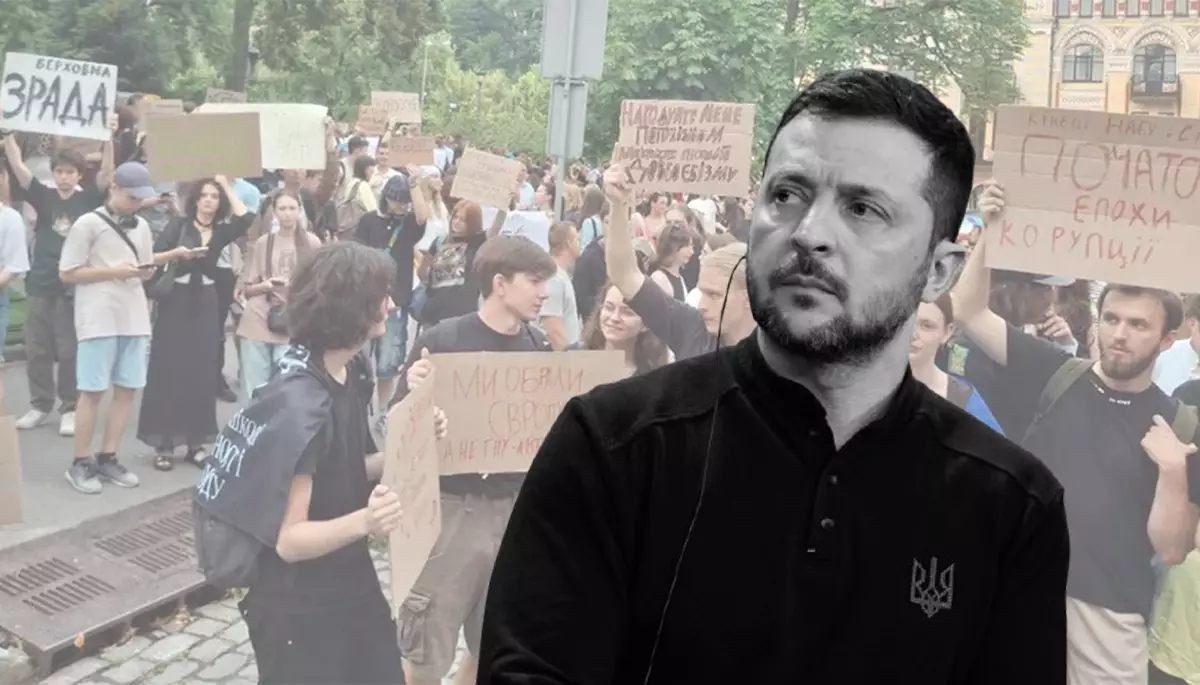



Українською читайте тут.
Propagandists are pleased with the criticism of the government for dismantling the anti-corruption infrastructure through draft law No. 12414.
On July 22, the Verkhovna Rada of Ukraine passed draft law No. 12414 in its second reading, and President Volodymyr Zelensky signed it. The bill was authored by four members of the Verkhovna Rada Committee on Law Enforcement.
According to the text of the draft law published by NV, the Prosecutor General of Ukraine gains the right to reassign cases from one group of prosecutors and investigators to another—including cases that, before the law taking effect, were exclusively handled by the National Anti-Corruption Bureau of Ukraine (NABU) and the Specialized Anti-Corruption Prosecutor’s Office (SAPO).
“The anti-corruption infrastructure will continue to function—just without Russian influence. Everything must be cleansed of that. And there must be more justice. Of course, NABU and SAPO will keep working. It’s important that the Prosecutor General is determined to ensure the inevitability of punishment in Ukraine for those who break the law… There must be no Russians involved. It’s important that punishment is inevitable and that society can truly see that,” said President Volodymyr Zelensky in his evening video address on July 22.
He also reported that he had discussed the draft law with Semen Kryvonos, Director of NABU; Oleksandr Klymenko, Head of SAPO; Prosecutor General Ruslan Kravchenko; and Vasyl Maliuk, Head of the Security Service of Ukraine.
A few hours earlier, Semen Kryvonos and Oleksandr Klymenko held a press briefing, during which Kryvonos stated:
“Ukraine’s anti-corruption infrastructure has been destroyed—an infrastructure created in response to the Euromaidan demand for justice and the public call to combat high-level corruption.”
On the evening of July 22, protests took place in Ukraine’s largest cities—Kyiv, Kharkiv, Dnipro, Odesa, Lviv, and others.
Even before news broke that Zelensky had already signed the law, civil society activists were calling on the president to veto draft law No. 12414. In a statement from the “Reanimation Package of Reforms” coalition of civil society organizations addressed to Volodymyr Zelensky, one of the main threats posed by the law is the transfer of powers from the head of SAPO—who was selected through a competitive process involving independent experts—to the Prosecutor General, who is appointed by politicians without a competition.
“Giving the Prosecutor General a monopoly on signing indictments for top officials, including members of the President’s Office, ministers, and their deputies, creates a conflict of interest,” the statement from RPR reads.
The adoption of the draft law also sparked reactions in Europe.
“The European Union is concerned about Ukraine’s recent actions regarding its anti-corruption institutions — NABU and SAPO. These bodies are key to reform in Ukraine and must operate independently to effectively fight corruption and maintain public trust,” said European Commission spokesperson Guillaume Mercier.
Mercier emphasized that Ukraine’s ability to combat corruption and ensure institutional resilience directly affects its prospects for future EU membership.
Despite concerns about the implications of draft law No. 12414, the European Commission stated that the EU does not intend to raise the issue of suspending financial assistance to Ukraine over actions affecting the National Anti-Corruption Bureau (NABU) and the Specialized Anti-Corruption Prosecutor’s Office (SAPO). “It’s not a discussion at this stage,” Mercier added.
EU Enlargement Commissioner Marta Kos called the Verkhovna Rada’s decision to dismantle NABU’s independence “a serious step back” and stressed that independent institutions like NABU and SAP are “key” to Ukraine’s path toward EU integration.
Several EU member states have expressed similar views.
“The independence and strength of Ukraine's anti-corruption institutions have been key to reform efforts of recent years. Ukraine will continue to be measured against their progress,” the German Foreign Ministry wrote on its X (formerly Twitter) account.
Former President of Estonia (2006–2012) Toomas Hendrik Ilves described the adoption of the law as “a complete disaster” and added:
“This will only fuel all those in Europe who think helping Ukraine is pointless, not to mention the whole Russian narrative of Ukrainians just stealing the West’s assistance for private enrichment, a narrative we have fought for years.”
According to European Pravda, a letter urging the Ukrainian authorities not to allow the law to come into force was sent to Deputy Head of the Presidential Office Iryna Mudra by Julia Fromholz, Head of the Anti-Corruption Division at the Organisation for Economic Co-operation and Development (OECD).
“If the issue raised by the adoption of this law remains unresolved, it will not only jeopardize Ukraine’s prospects of joining the OECD Anti-Bribery Convention and its efforts to accede to the OECD, but also undermine its credibility with international partners — particularly those considering investing in Ukraine’s defense sector and long-term reconstruction,” Fromholz wrote in the letter.
Search for “Russian Moles” Used as a Pretext for Raids
On July 21, one day before the vote on draft law No. 12414, raids were conducted on employees of the National Anti-Corruption Bureau of Ukraine (NABU). The Bureau reported 70 searches targeting 15 employees, carried out without court warrants. That same day, the Specialized Anti-Corruption Prosecutor’s Office (SAPO) reported that investigators from the Security Service of Ukraine (SBU) had gained access to all cases handled by NABU. The SBU conducted these checks while the heads of NABU and SAP were on official trips abroad.
“These actions could lead to the disclosure of information regarding covert investigative operations within numerous criminal proceedings currently under investigation by NABU and SAPO,” SAPO stated.
The SBU explained that the raids were part of an inspection of “compliance with legislation on state secrets within the Specialized Anti-Corruption Prosecutor’s Office.”
“The Security Service of Ukraine formally states: SBU personnel did not access information on all covert and operational measures or special operations conducted by NABU and SAPO. The SBU’s inspection does not involve full access to the content of such documents. Claims that SBU representatives may have revealed information about covert investigative actions carried out by NABU and SAPO are unfounded and manipulative,” read a statement on the SBU website.
Regarding the searches carried out without court approval, the SBU stated:
“Urgent investigative actions without a court order are not a violation of the law—in cases where obtaining such an order could result in information leaks and, in particular, compromise special operations related to investigations of collaboration with the aggressor state.”
On the same day, the Office of the Prosecutor General (OPG) published a message titled: “OPG and SBU Detain Officer from NABU’s Most Elite Covert Unit.”
“The said officer collected and transmitted identifying data of Ukrainian law enforcement officials and other citizens to enemy intelligence services. He extracted personal information from a classified law enforcement database. At least 60 episodes of transmitting restricted information to a handler have been documented. He received payments to his bank card for each such transmission,” the OPG stated.
The statement also claimed that NABU leadership had been informed about “potential risks involving their employee” but failed to respond.
On July 22, the OPG announced that Ukrainian MP Fedir Khrystenko had been involved in passing information to Russia with the help of a NABU employee. That day, a court ordered 60 days of pre-trial detention for the NABU officer suspected of treason.
Following the SBU’s visits to SAP and NABU, the G7 Ambassadors’ Group expressed “serious concern” over the developments and their intent to “discuss these events with government leaders.”
The G7 Ambassadors emphasized their “shared commitment to supporting transparency, independent institutions, and good governance” in Ukraine as essential components of the fight against corruption.
“SBU used against NABU the same scheme it has tested on hundreds of entrepreneurs: accusing them of treason for any economic ties with Russian counterparts. Or rather—not even for actual ties, but for the theoretical possibility of such ties... It’s clear that with such an extra-legal interpretation, the investigation stands no chance in court. But the logic of the scheme is not to prosecute in court, but to obtain the legal right to conduct searches, interrogations, seizures—and at the same time unleash a wave of smear campaigns against the ‘target,’” wrote Nashi Groshi founder Oleksa Shalaysky on Facebook.
The Ukrainian branch of the global anti-corruption movement Transparency International protested the law on its official X (formerly Twitter) page:
“This is a massive setback in anti-corruption reform and a direct threat to Ukraine's path to the EU!”
Even before the parliamentary vote, the organization had voiced opposition to the amendments to draft law No. 12414, arguing they could dismantle key guarantees of NABU and SAPO’s independence. These amendments include: granting the Prosecutor General the authority to withdraw cases from NABU and hand them over to other law enforcement bodies; acting as the de facto head of SAPO and delegating SAPO prosecutors’ powers to other prosecutors; issuing binding written instructions to NABU detectives; and unilaterally closing cases involving high-ranking officials.
Hlib Vyshlinsky, Executive Director of the Centre for Economic Strategy, compared the situation around Ukraine’s anti-corruption bodies to a post-revolution backlash. In addition to the raids on SAP and NABU, he cited as further signs of backlash the refusal to appoint the winning candidate as head of the Bureau of Economic Security and the criminal case and raids targeting Vitaliy Shabunin, Head of the Anti-Corruption Action Center.
Vyshlinsky believes that the dismantling of anti-corruption infrastructure will worsen Ukraine’s chances of joining the European Union.
“Why should other countries and the European Commission continue trying to overcome Hungary’s resistance if the candidate country itself is heading toward ‘Hungarian-style democracy’? And we’ll be left a buffer state—just as Putin dreams of,” Vyshlinsky wrote.
"The First Protests Against the Government Since the Full-Scale War Began": International Press Reactions
International media outlets covered both the vote on draft law No. 12414 and the demonstrations urging President Volodymyr Zelensky to veto it. In his report for The New York Times from the protests in Kyiv, Mark Santora describes a palpable sense of anger among demonstrators sparked by parliament’s decision to roll back anti-corruption efforts. In his article titled “Wartime Protests in Ukraine Target Zelensky for the First Time”, Santora refers to the rally outside the Ivan Franko Theater as the first major anti-government protest in Ukraine in three and a half years of war. Speaking with attendees, Santora quotes Dmytro Koziatynskyi, a veteran of the Russo-Ukrainian war and one of the protest organizers:
“We must take to the streets tonight and urge Zelenskyy to prevent a return to the dark days of Yanukovych.”
In The Wall Street Journal, authors Ian Lovett and Nikita Nikolaienko focus on the protests and whether recent developments signal a full consolidation of power around President Zelensky. They question whether rolling back certain freedoms for the sake of wartime governance is acceptable, and where the tipping point lies beyond which public trust begins to erode and international support weakens.
Veronika Melkozerova, writing for Politico, notes that Kyiv residents quickly self-organized the protest despite enduring sleepless nights caused by relentless Russian bombardments. She highlights the significant presence of war veterans, including individuals with amputations, who joined the demonstration calling on Zelensky to veto the bill.
Sources cited by The Economist said the attack on Ukraine’s anti-corruption infrastructure shocked even some within Zelensky’s own team. One official, speaking anonymously, said the speed at which the law was passed reminded them of the infamous “January 16 laws” enacted against protesters in 2014, shortly before President Yanukovych fled the country. Another source speculated that the Presidential Office may have sought to exploit changing attitudes of Donald Trump toward Vladimir Putin, expecting that international attention would not focus on Ukraine’s domestic issues at the moment.
Volodymyr Verbianyi and Daryna Krasnolutska, writing for Bloomberg, report that the government’s argument centers around strengthening coordination during wartime and neutralizing potential Russian influence over anti-corruption institutions. However, the immediate nationwide protest response was notable, with demonstrations not only in Kyiv but also in Lviv, Dnipro, and Odesa, all urging Zelensky to veto the newly adopted bill. Citing reactions from European officials and diplomatic circles, the authors warn that this significant regression in anti-corruption reforms could jeopardize future Western support for Ukraine. They add that dismantling anti-corruption institutions may even stall Ukraine’s EU accession efforts and risk suspension of visa-free travel with the bloc.
“Zelensky Has Finally Broken with the Sorosiata and Grant-Eaters”: Reactions from Russian Propagandists
Pro-Russian propaganda on Telegram channels actively exploits the topic of Ukraine’s anti-corruption bodies to promote narratives about foreign control and internal political scheming. Claims that NABU and SAPO are “projects of the U.S. Democratic Party” oversimplify the complex context of their creation and functioning, ignoring support from other international partners such as the EU and the legal independence of these institutions. At the same time, accusations against President Zelensky and his team of trying to subjugate anti-corruption bodies reflect real political tensions—but are framed manipulatively to suggest unchecked impunity. Propagandist channels also downplay the significance of the protests in support of NABU and SAP, portraying them as marginal and doomed to fail without external backing.
Propagandists emphasized supposed “foreign policy” reasons behind the new law, alleging that independent anti-corruption bodies serve the interests of U.S. Democrats, who claim to uphold the rule of law. Thus, the “attack” on NABU and SAPO is presented as Zelensky switching allegiances to the Republicans, who, they claim, are less concerned about Ukraine’s anti-corruption institutions.
One female propagandist with 496,000 Telegram subscribers noted that the “protective umbrella over the ‘independent anti-corruption bodies’ collapsed with the change of leadership in the White House. Both NABU and SAP are Democratic Party projects, and Trump and his team have no reason to defend them.” While it’s true that NABU and SAPO were established with international support (notably from the U.S. and EU) after the Revolution of Dignity (2014–2015), and that U.S. aid under the Obama administration supported reforms, labeling them solely as “Democratic Party projects” ignores the broader international and national context. These institutions also receive support from the EU, the European Anti-Corruption Initiative (EUACI), and the Danish development agency DANIDA, indicating that they are part of a wider anti-corruption strategy, not tied to one political party.
An anonymous Telegram channel with 117,000 subscribers claimed that “Zelensky has decided to dump the Democrats and fully switch to Trump’s side. He believes the globalists/Soros-linked crowd won’t be able to stop him because they need him to continue the war.” The same post added, however, that “a flood of kompromat leaks about Zelensky and Yermak will soon hit the Western press,” eventually leading to Zelensky being “replaced” by General Zaluzhnyi.
Other channels offered domestic political explanations. A million-subscriber channel claimed that “Andriy Yermak plans to take control of all security agencies previously linked to the West.” At the same time, propagandists spread the idea that this move would not have serious consequences for Zelensky, his team, or Ukraine. A channel with 395,000 followers wrote:
“Although NABU is one of the key conditions for financial support and EU integration, there won’t be any actual reduction in aid. The West needs Zelensky to continue the war with Russia.”
Another large channel with 1.1 million subscribers framed Zelensky’s actions as a power play, stating:
“Zelensky likely wants to trade the NABU case for halting investigations into his inner circle. If he pulls it off, he’ll show that his people are protected. Although everyone understands that NABU wasn’t digging into his circle—it was digging into the president himself.” That claim, however, is not backed by public evidence or official investigations directly targeting Zelensky. Most NABU cases concern corruption in previous administrations or among individual officials, not the current president. Propagandists exaggerate to fuel the perception of conflict between Zelensky and anti-corruption agencies.
One channel with nearly half a million subscribers predicted that NABU officials “will be imprisoned, intimidated, or made obedient... The bridges between Zelensky loyalists and the ‘Soros gang’ are burned. The grant-eaters’ nest will now bite the Zelenskyites in the ass.”
In the same post, the July 22 protests were described as a “small gathering” of “activists, anti-corruption figures, Euromaidan veterans, Sorosiata,” and “a kiloton of drama over the death of democracy.” The post questioned the effectiveness of the protests:
“To succeed, a Maidan needs, first, support from foreign powers—primarily the U.S.—and second, splits (ideally several) within the government structure itself.”
A Telegram channel with 438,000 subscribers added:
“Protests in support of NABU and SAPO are not yet a threat to the President’s Office, as they believe this is temporary. People will make noise and then go home.”
Conclusions
The adoption of draft law No. 12414 and the coordinated actions by law enforcement agencies against NABU and SAPO represent the most serious test for Ukraine’s anti-corruption infrastructure since its establishment following the Revolution of Dignity. European partners and G7 diplomats have expressed grave concerns about the future of anti-corruption efforts and the transparency of international financial aid usage. Experts warn of the risks of a suspension of the visa-free regime with the EU and a slowdown in European integration processes.
The draft law sparked the first mass protests against the government since the start of the full-scale war, catalyzing civic mobilization. Demonstrations in Kyiv, Lviv, Dnipro, and other cities showed the determination of civil society to defend democratic institutions even under martial law.
Actions by Ukrainian law enforcement and politicians have provided an opportunity for pro-Russian propaganda to revive narratives about infighting and intrigue within the Ukrainian government and “external control” of Ukraine. Propagandists used the reactions of Ukrainian and international experts, politicians, and media to amplify doubts about the Ukrainian state’s capacity.
Collage by: Mykola Shymanskyi


